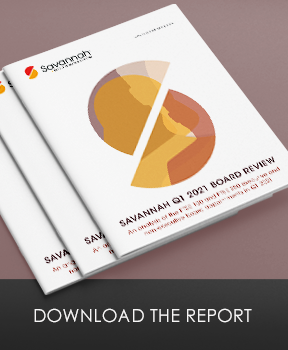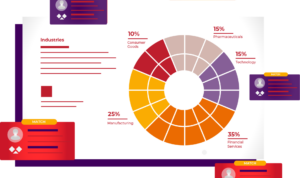An analysis of the FTSE 100 and FTSE 250 executive and non-executive board appointments in Q1 2021
INTRODUCTION
 I’m delighted to take over the role of presenting Savannah’s quarterly analysis of appointments to FTSE 100 and FTSE 250 boards, which always lends unique insight into the evolving PLC landscape. As is tradition, we have crunched the data to identify both new and continuing trends while also highlighting notable individual appointments for the period Q1 2021.
I’m delighted to take over the role of presenting Savannah’s quarterly analysis of appointments to FTSE 100 and FTSE 250 boards, which always lends unique insight into the evolving PLC landscape. As is tradition, we have crunched the data to identify both new and continuing trends while also highlighting notable individual appointments for the period Q1 2021.
Rising Covid-19 infections at the end of last year meant the first quarter of 2021 was dominated by another strict national lockdown in the UK. Yet despite the renewed stress on economic activity, and Covid-19 hospitalisations and deaths spiking higher than the 2020 peak, December to February saw the first quarterly drop in unemployment since 2019, ONS figures revealed.
The seemingly counterintuitive optimism among businesses and many consumers was, no doubt, largely the result of the UK’s successful vaccine rollout, which gained rapid momentum through Q1 2021, outpacing the rest of the world. Real-time activity data tracked by Jefferies, the investment bank, suggested the economy grew over 1% in March and April, which would mean the economy shrank by less than 1% in the first quarter, despite predictions from the Bank of England of a 4% decline. Jefferies joined Goldman Sachs and JP Morgan in predicting a rapid economic rebound later this year, upgrading its 2021 GDP growth forecast for the UK to 7%.
Fiona Motley
Partner, Board Practice and Head of HR Practice

Q1 2021
BOUNCING BACK
I’m happy to note the optimism was also reflected in FTSE 350 board appointments for Q1 2021, kicking off the year in spectacular fashion. Full-year 2020 had already seen a marked improvement on 2019, a year disrupted by Brexit chaos, with FTSE 350 appointments up 12%, albeit still slightly down on 2018 (3%). However, early signs indicate that board activity in 2021 will eclipse both 2020 and 2019, and also possibly 2018. In Q1 2021, there were 139 board appointments in total across the FTSE 350, up 23% on Q1 2020 and 26% on Q1 2019.
Breaking that down, FTSE 250 board appointments reached 88, up 17% on Q1 2020 and 22% on Q1 2019. FTSE 100 board appointments were even more buoyant, rising to 51 which is 34% higher than the same quarter both last year and in 2019. If this trend continues, which we believe it will if the economic rebound goes as analysts expect, 2021 will be a very active year.
NED AND ED DISPARITY
As ever, however, the devil is in the detail, and separating the data into executive director appointments and non-executive director appointments exposes a different picture. NED activity was, indeed, very high in Q1 2021, hitting 47 in the FTSE 100, a 52% uplift on Q1 2020 and 68% on Q1 2019, and reaching 72 in the FTSE 250, 14% and 36% higher than 2020 and 2019 respectively. Yet, meanwhile, FTSE 100 executive activity, mainly CEOs and CFOs, dipped, with only four appointments versus seven in Q1 2020 and 10 in Q1 2019. While executive appointments in the FTSE 250 were up 33% on Q1 2020, they were down 16% on Q1 2019.
There could be several reasons for this. It could expose the more deeply held trepidation among UK PLCs that still exists as the country seeks to emerge from the Covid-19 crisis. Or, possibly more likely, companies are still hesitant about changing personnel in crucial executive roles while they are still, by and large, in crisis recovery mode. Meanwhile, executive directors are also more likely to be holding off their own career aspirations until the market turbulence has calmed. Executive movement could well accelerate as the year progresses and confidence grows larger.
NOTABLE APPOINTMENTS
Amongst the NED and executive activity in the first quarter of 2021, there were a number of notable appointments. Baroness Shriti Vadera was the only female FTSE 100 chair appointment, and one of only six chair appointments overall, as she took the reins at insurance firm Prudential. A former government minister, Baroness Vadera was the first woman to head a major British bank when she held the role of chair at Santander UK between 2015 and 2020.
The five male FTSE 100 chair appointments included Robin Budenberg at Lloyds Banking Group, who succeeded Lord Blackwell. Budenberg will continue to serve as chair of The Crown Estate. Following the retirement of Antonio Vazquez from IAG, the AngloSpanish airline holding company of British Airways, Iberia, Aer Lingus and Vueling, Javier Ferrán took the chair, having been on the board since 2019. He remains chair of Diageo, the world’s largest spirits maker.
FTSE 250 chair appointments included Jasmine Whitbread, who left the nonprofit sector where she had served CEO roles at Save the Children and London First, to take the top spot at Travis Perkins. Nicoletta Giadrossi was elevated from NED to chair of Scottish oil firm Cairn Energy.
Executive appointments in the FTSE 100 included former Rolls-Royce finance chief Stephen Daintith, who was appointed as Ocado’s new CFO, and Informa’s Patrick Martell, who was brought onto the board as COO while continuing as CEO of Informa Business Intelligence.
In the FTSE 250, 16-year Centrica veteran Kate Ringrose was named CFO of the energy giant, a promotion from her prior role as Group Financial Controller. Mick Jeavons, interim CFO of Royal Mail since May 2020, took on the role permanently while joining the board. Kenton Jarvis, former CEO of Aviation at TUI, joined easyJet as Group CFO, while Virgin Money UK also appointed a new CFO in Clifford Abrahams, previously of ABN AMRO Bank in the Netherlands.
Homeserve, the home repairs and improvements business, recruited Ross Clemmow to its board and in a new role as Chief Executive EMEA, reporting to Founder and Group Chief Executive Richard Harpin. Clemmow was previously CEO of online sports retailer WiggleCRC.
GENDER REPRESENTATION
Since we started reporting on FTSE 350 board appointments in 2018, we have tracked the split between male and female appointments. Savannah is passionate about increasing diversity in PLC boardrooms, and so we will continue recording and analysing this data throughout 2021.
As noted in our 2020 review, the publication in February 2021 of the final report of the five-year government-backed Hampton-Alexander Review revealed its well-publicised target of having 33% of FTSE 350 board positions held by women had been met. Indeed, the rapid rise in the number of women in UK boardrooms has been reflected in our own board publications in recent years. Looking at the data more granularly, however, shows just how much further there is to go.
EXECUTIVE GAP
Again, it is the contrast between NED and executive appointments that expose the challenges, which in this instance is the comparative lack of female representation in executive roles. In 2020, women took only 18% of FTSE 100 executive director appointments, compared with 30% in 2019, though FTSE 250 representation was slightly more favourable, rising from 15% to 20%.
Disappointingly, there were no female appointments to FTSE 100 executive roles in the first quarter of 2021, though this was the same as Q1 2020 and only marginally worse than the same quarter in 2019 when there was just one female appointment. Women did fare better in the FTSE 250, with 4 female appointments in Q1 2021, yet still equating only to 25%, a big dip on Q1 2020 when 42% of appointments were female, though better than the 16% representation in Q1 2019.
NED SKEW
The situation couldn’t be more different in NED roles, where gender representation in new appointments remained largely where it has been for several years now, which is edging more favourably towards women. Some 55% of FTSE 100 NED appointments were women in Q1 2021, a slightly higher percentage than both 2020 and 2019, while 56% of FTSE 250 NED appointments were also women, compared to 63% in Q1 2020 and 47% in Q1 2019. Overall, women made up half of all FTSE 350 board appointments in Q1 2021, around the same as Q1 last year, though with a very obvious skew towards NED roles.
The continued gap between female NED and executive appointments is one of the most important governance issues facing UK PLCs today. It is disingenuous for companies to claim victory in boardroom gender parity when women are still overlooked for the majority of executive positions. This is something we hope to see improve through the rest of our 2021 board reviews.
As with all of our reports, our primary source is BoardEx and we edit the raw data to exclude, for example, internal promotions such as NED to SID and non-independent shareholder employee appointments. We prepare these reports as a contribution to the corporate governance debate which we are always happy to engage on. I hope you find this report interesting and relevant.




